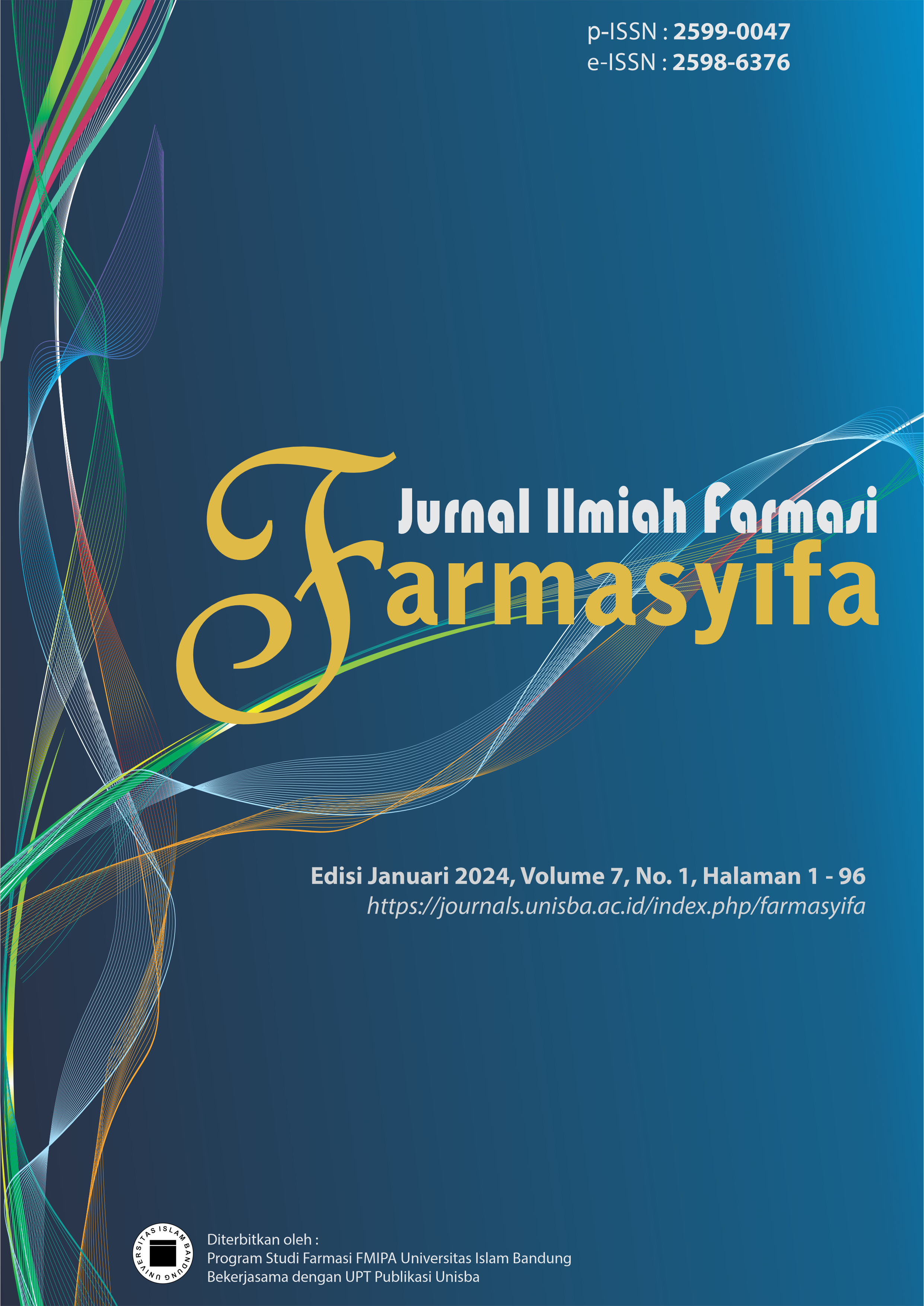TREATMENT PERCEPTIONS ON SATISFACTION THERAPY WITH DIABETES MELLITUS TYPE II PATIENTS
PERSEPSI PENGOBATAN TERHADAP KEPUASAN TERAPI PASIEN DIABETES MELLITUS TIPE II
DOI:
https://doi.org/10.29313/jiff.v7i1.2853Keywords:
treatment perception, therapeutic satisfaction, type II diabetes mellitusAbstract
One of the multifactorial diseases with a high prevalence in Palu City in 2021 is diabetes mellitus. There are 26,204 people suffering from type II diabetes mellitus. This study aims to determine the relationship between treatment perception and satisfaction of patients with type II diabetes mellitus at one of the regional general hospitals in Palu City. The research method used was observational with cross-sectional method, as many as 100 respondents were used in this study with random sampling technique, data collection using general Beliefs about Medication2 Questionnaire (BMQ) instrument and Diabetic Medication Satisfaction Tool (DMSAT). The results showed that the treatment perceptions of the respondents were in category of negative perception (42%) and positive perception (58%), for therapy satisfaction the results were in category of very satisfied (6%), satisfied (86%) and moderately satisfied (8%). From the results of the chi-square test, the p-value is 0.042, which means that there is a relationship between treatment perceptions and respondents' therapy satisfaction. Therefore, it can be concluded that the factor treatment perception is able to increase therapy satisfaction in type II diabetes mellitus patients. This study is expected to provide input to improve pharmaceutical services in the provision of therapy to patients with chronic diseases.
References
Anggreini, S, N., & Lahagu, E, L. (2021). Pengaruh pendidikan kesehatan tentang diabetes mellitus terhadap sikap responden diabetes mellitus tipe 2 di wilayah Puskesmas Rejosari Pekanbaru. Menara Ilmu, 15(2), 62-71. https://doi.org/10.31869/mi.v15i2.2950
Ayutthaya, S, S., & Adnan, N. (2020).Faktor risiko hipertensi pada penderita diabetes mellitus tipe 2.Jurnal Ilmu Kesehatan Masyarakat, 9(2), 60-71. https://doi.org/10.33221/jikm.v9i02.512
Chairunisa, C., Arifin, S., & Rosida, L. (2019). Faktor-faktor yang berhubungan dengan perilaku kepatuhan minum obat anti diabetes pada penderita diabetes mellitus tipe 2. Hemeostatis, 2 (1), 33-42. https://doi.org/10.20527/ht.v2i1.426
Dinas Kesehatan Sulawesi Tengah.(2021). Profil Kesehatan Sulawesi Tengah Tahun 2021.Palu : Dinas Kesehatan Sulawesi Tengah.
Gusti, E, K., Kuswinarti., & Anisah, D. (2020). Persepsi responden DM tipe 2 terhadap penggunaan obat antidiabetes oral di RSUD Dr. Hasan Sadikin Bandung. JMPF, 10(1), 56-65. https://doi.org/10.22146/jmpf.51856
Hasina, R., Probosuseno., & Wiedyaningsih, C. (2014). Hubungan tingkat kepatuhan, kepuasan terapi dengan kualitas hidup pasien lanjut diabetes melitus tipe 2.Jurnal Manajemen dan Pelayanan Farmasi, 4(4), 251-256. https://doi.org/10.22146/jmpf.295
International Diabetes Federation.(2021). IDF Diabetes Atlas Ten edition-2021.
Milita, F., Handayani, S., & Setiaji, B. Kejadian diabetes mellitus tipe II pada lanjut usia di Indonesia . Jakarta. Jurnal Kedokteran dan Kesehatan, 17(1), 9-20. https://doi.org/10.24853/jkk.17.1.9-20
Nadirawati., & Pratama, I. (2021).Studi fenomenologi pengalaman klien lansia dalam melakukan perawatan diabetes mellitus tipe II. Journal of Telenursing, 3(1), 20-36. https://doi.org/10.31539/joting.v3i1.2076
Nanda, O, D., Wiryanto, B., & Triyono, E, E. (2018). Hubungan kepatuhan minum obat anti diabetik dengan regulasi kadar gula darah pada responden perempuan diabetes mellitus. https://doi.org/10.20473/amnt.v2i4.2018.340-348
Persatuan Endokrinologi Indonesia (PERKENI). (2021). Konsensus pengelolaan dan pencegahan diabetes mellitus tipe di Indonesia. Jakarta: Pengurus Besar Perkumpulan Endokrinologi Indonesia.
Ratnasari, P, M, D., Andayani, T, M., & Endarti, D. (2020).Analisis outcome klinis berdasarkan kualitas hidup dan biaya medik langsung responden diabetes mellitus tipe 2. Jurnal Sains Farmasi & Klinis, 7(1), 15-22. https://doi.org/10.25077/jsfk.7.1.15-22.2020
Syekh, B, A., Arabiat, D, H., Holmes, S, L., Khader, Y., Hiyasat, D., Collyer, D ., & Sheikh, S, A. (2017). Correlates of treatment satisfaction and wellbeing among patients with type II diabetes.Yordania.International Council of Nurse. https://doi.org/10.1111/inr.12358
Wahyuni, S., dan Alkaff, R, N. (2013). Diabetes mellitus pada perempuan usia reproduksi di Indonesia tahun 2007. Jakarta. Jurnal Kesehatan Reproduksi, 3(1), 46-51.
Widiasari, K, R., Wijaya, I, M, K., dan Suputra, P, A.Diabetes mellitus tipe II: faktor risiko, diagnosis, dan tatalaksana. (2021). Bali. Ganesha Medicina Journal, 1(2), 114-120. https://doi.org/10.23887/gm.v1i2.40006
Downloads
Published
How to Cite
Issue
Section
License
Copyright (c) 2024 Nurul Ambianti, Amalia Purnamasari Zainal, Amelia Rumi, Khudriah Rezkia, Muhammad Tamrin

This work is licensed under a Creative Commons Attribution-NonCommercial-ShareAlike 4.0 International License.






















